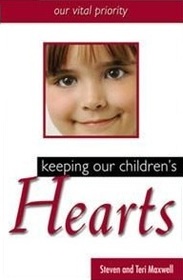Maribeth C. (mbcinhouston) reviewed Keeping Our Children's Hearts: Our Vital Priority on + 44 more book reviews
Well written and clear book, focused not so much on details, but general concepts of how sheltering our children and spending time with them developes a loving child who doesn't WANT to rebel as a teenager or young adult. This is written from a Christian point of view, with lots of scriptural references to back up the authors' reasonings. The focus is on young and future families. Nothing in this book goes against the current "attachment parenting" philosophies, which was my greatest worry before reading it.
Keeping was written for parents who wish to cultivate a conservative, fundamentalist, and (extremely) sheltered family culture. They provide great reflections on raising children (especially young children who DO NEED to be sheltered from adult decisions and content), however, they advocate for a degree of sheltering that is unnecessary and unhealthy (literally no activities/hobbies/interests outside of what the family can do together and no job outside of a family business - even as an adult!). While simultaneously saying each family should choose the amount of sheltering best for themselves, they snare you with scripture conveniently placed to convince you of their philosophy. Without your own family culture firmly intact, this book may quickly frighten and sway you to a lifestyle in which you shelter your children to the point they are unable to see wrong, address it, and conquer it.
I am reminded of an anecdote that I will amend to fit the vein of this book: Imagine your teenage son is at church with the family. He is talking with a group of kids his age not far from where you are talking to some friends of your own. A girl, new to the church, is brought over to his friends to be introduced. She is dressed in a manner you find immodest; short skirt, cleavage exposed, etc. Your (hormonal) son has three options: he can stare at her lustfully, advert his eyes and excuse himself from the group, or, while noticing her dress and body choose to focus his attention on her face and demeanor. The Maxwell's counsel would be for him to avert his eyes and walk away. What then will this poor boy learn? That he cannot control himself? That she is unworthy of his friendship? We CAN gradually teach our children morals and guide them to independence, although the Maxwells don't seem to agree. We must learn to deal with problems before we are tossed into the world, however, the authors would have you sheltered by parents and then by spouse as they advocate a secluded lifestyle (family oriented activities only, no independent hobbies, family businesses with minimal outside help).
The Maxwells's good and provoking main questions to you are, "Do you have your child's heart? What are you doing to keep it?" The problem with their approach is that while you would gain your child's heart you would also control their conscience, instead of helping it develop at a healthy pace. There are smart ideas to be gleaned throughout the book, but they must be applied in a "shepherding" not "sheltering" manner.
tl:dr
Pros: Good advice offered for redirecting adolescents' activities and interests to a more family-focused culture vs the popular, individualist and family-separating culture of busy lifestyles. Good advice geared towards sheltering littles.
Cons: Advocates an unhealthy, conscience controlling parenting philosophy from their interpretation of scripture that sets a child/teen/adult up to have no practical experience at choosing right or wrong in a worldly context.
I am reminded of an anecdote that I will amend to fit the vein of this book: Imagine your teenage son is at church with the family. He is talking with a group of kids his age not far from where you are talking to some friends of your own. A girl, new to the church, is brought over to his friends to be introduced. She is dressed in a manner you find immodest; short skirt, cleavage exposed, etc. Your (hormonal) son has three options: he can stare at her lustfully, advert his eyes and excuse himself from the group, or, while noticing her dress and body choose to focus his attention on her face and demeanor. The Maxwell's counsel would be for him to avert his eyes and walk away. What then will this poor boy learn? That he cannot control himself? That she is unworthy of his friendship? We CAN gradually teach our children morals and guide them to independence, although the Maxwells don't seem to agree. We must learn to deal with problems before we are tossed into the world, however, the authors would have you sheltered by parents and then by spouse as they advocate a secluded lifestyle (family oriented activities only, no independent hobbies, family businesses with minimal outside help).
The Maxwells's good and provoking main questions to you are, "Do you have your child's heart? What are you doing to keep it?" The problem with their approach is that while you would gain your child's heart you would also control their conscience, instead of helping it develop at a healthy pace. There are smart ideas to be gleaned throughout the book, but they must be applied in a "shepherding" not "sheltering" manner.
tl:dr
Pros: Good advice offered for redirecting adolescents' activities and interests to a more family-focused culture vs the popular, individualist and family-separating culture of busy lifestyles. Good advice geared towards sheltering littles.
Cons: Advocates an unhealthy, conscience controlling parenting philosophy from their interpretation of scripture that sets a child/teen/adult up to have no practical experience at choosing right or wrong in a worldly context.




